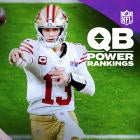On Wednesday the Second Circuit Court of Appeals levied a painful blow to Tom Brady's chances of playing the first four weeks of 2016 when it declined to rehear Brady's case with a full panel of judges.
The only recourse left for Brady in his fight against the NFL now becomes the United States Supreme Court. And even that opportunity represents a very slim chance, according to Tom Gies, a management side labor lawyer with Crowell & Moring who is not involved in the case.
Gies told CBSSports.com while you can't ever rule out the Supreme Court taking a case, the odds are largely stacked against Brady.
"While one would never say never, the chances of this getting heard by the Supreme Court are very, very low," Gies said. "Supreme Court review is discretionary. The Court decides to hear less than five percent of the cases that are filed. The typical reason the Court would grant a case -- what lawyers call a 'circuit split' -- doesn't seem to be present here."
A circuit split involves courts from two different circuits having rulings that are at odds with one another.
"The most common reason raised by a party seeking review by the Supreme Court, through a petition for certiorari, is to argue that the appellate court decision should be reviewed because of a 'circuit split.' That's a situation in which there is a direct conflict in the holding and result of the case, between or among decisions reached by other circuit courts," Gies said. "While lawyers often debate whether there is in fact a circuit split, it would be hard to make a compelling argument that the Second Circuit's decision in Brady creates a classic circuit split. For one thing, Deflategate is a unique fact pattern.
"Beyond that, the holding of the Second Circuit doesn't appear to establish a hard and fast rule of law that is inconsistent with decisions reached by other circuits. Challenges to labor arbitration cases are, by definition, pretty fact-specific. The Second Circuit decision in this case is solidly in that category, which would make it difficult to argue that it's irreconcilable with other court decisions that have refused to overturn a labor arbitrator's award.
"Finally, the fact that the district court's decision to overturn the award was unusual, which is one of the reasons it generated so much publicity, would be another factor the Court would probably take into consideration in deciding whether to grant a petition that might be filed by the union."
Multiple courts have ruled in different manners when it comes to the Brady case. Judge Richard Berman of the United States District Court for the Southern District of New York did vacate Brady's suspension in September of 2015. And, yes, that is in direct contrast to the Second Circuit's decision to reinstate his suspension.
But the circuit split involves disagreements among the, well, different circuits (there are 11 of them plus a D.C. Circuit and a Federal Circuit). So Brady's legal team could try to find an example of a similar case to Brady's -- not necessarily sports-related and certainly not requiring allegedly deflated footballs -- from a different circuit with a different ruling.
As Gies noted, this is a matter of labor arbitration at this point.
What makes all of this particularly tricky is the timing. The union and Brady have 90 days to file a petition for certiorari (the technical legal term for asking to take the case to the Supreme Court).
It's possible Brady's camp could get a stay of the suspension while filing but that would potentially put Brady in a precarious situation for the 2016 season. Ninety days from Wednesday is Oct. 11, 2016. The Supreme Court might take several months to decide on hearing the case, which could put their decision anywhere between December 2016 and March 2017.
If everything goes right for the Patriots, losing Brady in January of 2017 would be much worse than losing him in September of 2016.
The long story short lesson here? Deflategate isn't over yet, but Brady is backed into a very small corner with a short chance of getting out without serving a four-game suspension.






















